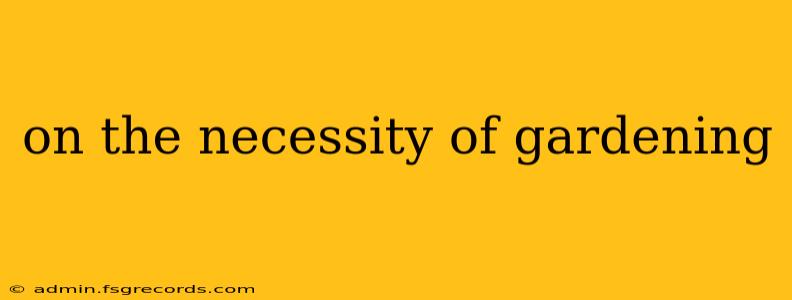In a world increasingly dominated by concrete jungles and digital distractions, the simple act of gardening emerges as a powerful necessity, offering a wealth of benefits extending far beyond aesthetically pleasing blooms. This isn't merely a hobby; it's a crucial practice contributing to our physical, mental, and environmental well-being. Let's delve into why gardening is not just desirable, but essential in modern life.
The Physical Rewards of Getting Your Hands Dirty
Gardening provides a surprising amount of physical activity, often unnoticed amidst the tranquil beauty. From digging and weeding to planting and harvesting, you're engaging multiple muscle groups, improving strength, flexibility, and cardiovascular health. This gentle exercise is accessible to people of all ages and fitness levels, making it a perfect way to incorporate movement into daily life. Furthermore, the fresh air and sunlight exposure contribute to increased Vitamin D levels, vital for bone health and overall well-being.
Boosting Your Immune System: Nature's Pharmacy
Beyond the physical exertion, the very act of interacting with soil has been linked to improved immunity. Exposure to beneficial microorganisms in the soil can stimulate the production of natural antibodies, strengthening your body's defenses against illness. This "grounding" effect, connecting you directly to the earth, can also reduce inflammation and stress levels.
The Mental Oasis: Nurturing Your Mind Through Nature
In today's fast-paced, demanding world, mental health is paramount. Gardening offers a powerful antidote to stress and anxiety. The repetitive motions of weeding or planting can be meditative, providing a much-needed escape from the constant stimulation of modern life. The act of nurturing plants, watching them grow, and eventually harvesting their bounty fosters a sense of accomplishment and purpose.
Connecting with Nature: A Pathway to Peace
Gardening provides a direct connection to nature, a crucial element often missing in urban environments. The sights, sounds, and smells of a garden are inherently calming, reducing stress hormones and promoting relaxation. Observing the natural cycles of growth and decay can foster a deeper appreciation for the interconnectedness of life, providing a sense of perspective and peace.
The Environmental Imperative: Growing a Sustainable Future
The environmental benefits of gardening are undeniable. By growing your own food, you reduce your reliance on industrial agriculture, minimizing your carbon footprint and supporting local ecosystems. Homegrown fruits, vegetables, and herbs are typically free from harmful pesticides and herbicides, contributing to a healthier diet and a healthier planet.
Conserving Resources: Small Actions, Big Impact
Gardening can also contribute to water conservation through practices like rainwater harvesting and drip irrigation. Furthermore, by choosing native plants, you support local biodiversity and create a haven for pollinators like bees and butterflies. These small actions contribute significantly to a larger movement towards environmental sustainability.
Conclusion: Planting the Seeds of a Better Life
Gardening is far more than a simple pastime; it's a vital practice that nourishes our bodies, minds, and the planet. The benefits are multifaceted and profound, offering a pathway to better physical and mental health while contributing to a more sustainable future. So, consider planting those seeds – you might be surprised at the abundant harvest you reap.

